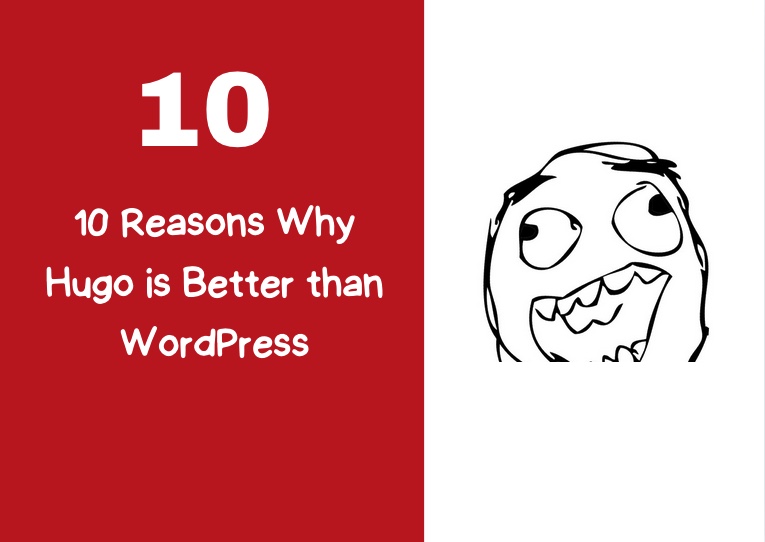
10 Reasons Why Hugo is Better than WordPress
- Wordpress
- July 28, 2025
Table of contents
In this article, we explore 10 reasons why HUGO is better than WordPress. WordPress is by far the most widely used CMS worldwide, but this notoriety has always been based on one feature: ease of use. Beginner web designers start with WordPress, clients ask for WordPress because it’s easy and they can manage it independently. It’s the Swiss Army knife of site generators—but would you have surgery with a Swiss Army knife?
Hugo is incredibly faster than WordPress
Hugo is a static site generator that creates ready-to-serve HTML pages. This makes it up to 100 times faster than WordPress, which generates pages dynamically at each visit, even with caching enabled.
With Hugo, you don’t need caching plugins, CDNs, or optimized servers: the site is static and fast by nature. The result is noticeable to the naked eye, with pages loading in a fraction of a second.
No database, more security, and less maintenance
WordPress is based on PHP and MySQL, and is therefore subject to vulnerabilities, SQL injection attacks, and requires continuous updates.
Hugo instead generates only static HTML, CSS, and JS files, with no database or server-side executable code: there’s nothing to hack.
Full control over HTML code and SEO
With Hugo, you can write your own templates, manage meta tags, URLs, sitemaps, and semantic markup natively, without relying on SEO plugins.
You can:
- Customize every HTML tag
- Add JSON-LD, Open Graph, canonical, hreflang
- Define clean and targeted permalinks
Write in Markdown, distraction-free
With Hugo, you write your content in Markdown, a fast, simple, and readable format. It’s perfect for Git versioning, portability, and automation.
WordPress requires visual editors, which risk inserting messy code or dependencies on shortcodes. This often happens unknowingly to editors who copy and paste text not realizing they’re pasting garbled source code.
Free and super scalable hosting
Hugo sites can be hosted for free on:
- GitHub Pages
- Netlify
- Vercel
No PHP/MySQL servers or complex backups needed. Hugo is lightweight and portable, even in enterprise environments.
Ideal for large and high-traffic projects
Hugo can generate thousands of pages in seconds without losing performance. It’s perfect for:
- Blogs with thousands of articles
- Technical documentation
- Corporate or institutional websites
With WordPress, such volumes require expensive VPS, dedicated servers, aggressive caching, and lots of maintenance.
Hugo doesn’t need complex plugins and themes
In Hugo, you don’t need plugins: you can handle every functionality in templates using variables, conditions, partials, and custom shortcodes.
In WordPress, every additional need requires plugins, increasing complexity and risk of incompatibility. Plugins receive updates that may conflict with each other or WordPress core, causing breaks and malfunctions.
Git as backend, perfect for team collaboration
With Hugo, everything lives on Git: content, configurations, themes. This allows:
- Advanced versioning
- Revisions and collaborations
- Automated deploys via CI/CD
In WordPress, everything is in the database and files, making structured teamwork difficult.
Extreme customization with conditional logic
In Hugo templates, you can use:
if,range,with,where,partial,dict- Controls based on content type, language, taxonomy
- Custom templates for sections, tags, dates, and more
In WordPress, you need custom PHP or advanced page builders.
No dependency on external software
With Hugo, you only need:
- A text editor (VS Code, Sublime, etc.)
- A terminal
- Git
No backend, logins, plugins, backups, or databases to manage. Everything is clean, portable, and stable over time.
✅ Responsive comparison table
| Feature | Hugo | WordPress |
|---|---|---|
| Native speed | ⭐⭐⭐⭐⭐ | ⭐⭐ |
| Security | No attack surface | Requires attention and updates |
| SEO control | Total, native | Plugin dependent |
| Content management | Markdown + Git | Database + backend |
| Scalability | Very high | Limited, requires VPS |
FAQ on Hugo vs WordPress
Is Hugo suitable for non-technical clients?
Yes, if you use Decap CMS or headless interfaces, you can provide a visual editing experience.
Can I use Hugo for multilingual sites?
Certainly. Hugo has advanced native multilingual support.
Is Hugo compatible with tracking tools?
Yes, you can integrate Google Analytics, Facebook Pixel, and other scripts directly in the templates.
Can I use Hugo for ecommerce?
Indirectly, with external solutions (Snipcart, Shopify headless), but it’s not its native domain.
Can Hugo deploy be automated?
Yes. You can use Netlify, Vercel, GitHub Actions, GitLab CI/CD, etc.















